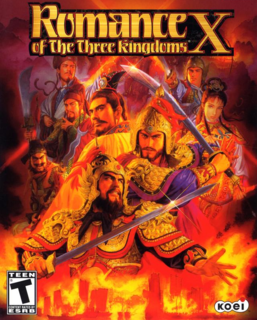A great experience for fans of the series, and not a bad rental for casual players.
RoTKX takes place in the same time period; 184 until about 270. You have a large selection of the historical officers to choose from, not to mention over 100 created characters to customize. It does matter, to some degree, which kind of character you pick. You can choose the warlord, good at tactics, and able to hold your own on the battlefield, but not exactly the strongest in dueling. You can be the warrior, good on the battlefield, and dueling, but pretty much dumb. Or, you can create 100 officers all with stats maxed at 100 and completely dominate China. The choices for your officer are for all intents and purposes, endless.
After choosing a character, you're thrusted into ancient China as a ronin, vassal, prefect, viceroy, or ruler. Each rank has the same basic commands: communicating with fellow officers, improving your city, talking with townsfolk, buying and selling items, and what not. The list of 'basic' activities is vast, which can be a problem, considering the time in the game is measure in days. You won't be able to do everything and effectively conquer China at the same time.
The more advanced commands come with higher rank. As a ruler, if you're famous, powerful, and large enough, you can wage a campaign for a specific area of China, assuming you have a city in that area. Also as a ruler, you can chose to roam China as a rogue force with willing vassals. A viceroy is a ruler for the ruler; you rule over more than one city in an assigned region, and for the most part get the same commands as a prefect or ruler, but your commands must meet the approval of the ruler first. However, the most annoying parts of being a ruler, prefect, or viceroy are the petitions. Every so often, your petitions will pile up in your city, most of which are useless banter that throws you off schedule for what can be months on end if you don't keep up. And if you don't keep up, your city safety drops, and you look like a mean little jerk.
Next, is war. Battles take place on typically generic fields, in front of castle gates, or in the city. The field itself is grided, and the actions you can perform are determined by your AP. Battles are very straightforward, and can be difficult depending on how many troops you have, and the quality of your commanding officers. Thankfully, you have the option to skip battles. This is handy, because you'll find yourself in a lot of battles if you like to be a warmongerer; playing through constant battles can be dull and tenacious.
Campaigns, on the other hand, are rewarding, but incredibly lengthy. If you launch a campaign, you select cities to send armies from, and are taken to a vast, grided map of the region you're vying for. First, you go through diplomacy with the many lords in the contested region, in hopes to gain them as an ally, and not an enemy. If that fails all-around, you must battle and defeat every city in that area to gain complete control. For the most part, campaigns last so long that they're rarely successful, but they add some variety to the game.
Dueling is different this time around. The availability of special moves are dependent on your officer's dueling skills on the character info. These moves can be obtained by winning several duels, training with an officer that has that dueling ability, and beating them in a duel. If successful, they teach you the skill, and you're that much better at dueling. Hooray. Duelist rely on their war ability to be effective at dueling. In duels, you pick the kind of attack you wish to do, and that attack will deal a lot, or little damage depending on the other attacks your opponent uses. Duels are very straightforward, but are easily less tenacious than battles.
Debates occur when diplomacy goes wrong, or you can initiate a debate when prompted to during historical events. Debates take place on a bridge, and the goal is the force your opponent off that bridge. Your weapons are special skills as seen on your character info sheet, and standard commands that act as rock-paper-scissors. I don't recommend debates, and they're frustrating, and very boring.
RoTKX differs in that it actually contains historical events. Other installments had events, but you had to meet ridiculous requirements to view them. RoTKX events occur as the game progresses, but the major flaw is that they occur somewhat at the wrong time. For instance, in 196, Cao Cao and Yuan Shao would be fighting at Guan Du, which didn't actually occur until 200. Regardless, this will give history buffs something to finally giggle happily about.
Finally, the graphics. It's an RTK game, meaning the graphics are outdated. Thankfully though, it doesn't detract from the overall gameplay too much.
All in all, RoTKX is a solid turn based strategy game that fans will enjoy, and casual players should at least be able to find a few good hours of enjoyment. It's not perfect, but it's definately worth checking out.

